

Perfecting Your First Page: 3 Tasks or Exercises. Delacroix, Faust Trying to Seduce Margarete (detail) Over the weekend, I was a speaker at the Missouri Writers Guild conference (a terrific group of people and an impeccably run event).

One of my sessions focused on evaluating the first page of your novel or memoir manuscript. Here are 3 of the best exercises or tasks you might undertake when thinking about your first page and how you can improve it before sending it to agents or editors. What is the absolute latest moment in the manuscript you can begin your story, and still not leave out anything that’s critical to the story problem? William Shunn : Manuscript Format : Short Story - StumbleUpon. English 50 Exercises for Story Writers. English 50 – Intro to Creative Writing: Exercises for Story Writers Basic Theory: What is a short story?
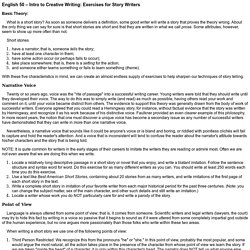
As soon as someone delivers a definition, some good writer will write a story that proves the theory wrong. About the only thing we can say for sure is that short stories are short and that they are written in what we call prose. Some attributes, however, seem to show up more often than not. Short stories have a narrator; that is, someone tells the story; have at least one character in them; have some action occur (or perhaps fails to occur); take place somewhere; that is, there is a setting for the action; and someone either learns something or fails to learn something (theme).With these five characteristics in mind, we can create an almost endless supply of exercises to help sharpen our techniques of story telling. Narrative Voice Twenty or so years ago, voice was the "rite of passage" into a successful writing career. If you've written a story in third person, try it in first.
Creative Writing For Dummies Cheat Sheet. Rewriting and editing helps to tighten up your work.

But it can be difficult – what to chop and when to stop may not be clear, and you may change your mind more than once during the process. Ask yourself whether you need to take out: Unnecessary information and explanation. Passages of dialogue that go on too long. Clunky descriptions that give too much detail. A Simple Novel Outline - 9 questions for 25 chapters & H.E. Roulo - StumbleUpon. Just as every tree is different but still recognizably a tree, every story is different but contains elements that make it a story.
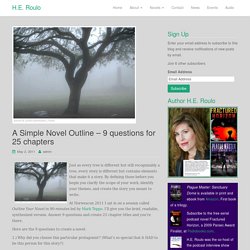
By defining those before you begin you clarify the scope of your work, identify your themes, and create the story you meant to write. At Norwescon 2011 I sat in on a session called Outline Your Novel in 90-minutes led by Mark Teppo. I’ll give you the brief, readable, synthesized version. Answer 9 questions and create 25 chapter titles and you’re there. Themes & Things To Keep In Mind When Writing Fantasy Stories and... - StumbleUpon. This list is far from complete.
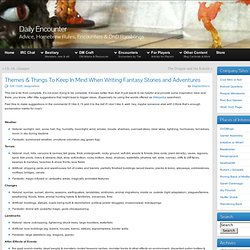
It’s not even trying to be complete. It knows better than that. It just wants to be helpful and provide some inspiration here and there; you know, offer little suggestions that might lead to bigger ideas. (Especially by using the words offered as Wikipedia searches!) Feel free to make suggestions in the comments! Weather Natural: sunlight, rain, snow, hail, fog, humidity, moonlight, wind, smoke, clouds, shadows, overcast skies, clear skies, lightning, hurricanes, tornadoes, moon in sky during daytimeFantastic: summoned weather, unnatural coloration (eg. green fog) General Fiction. Getting Around...
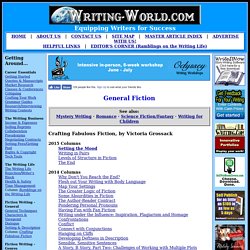
Career Essentials Getting Started Queries & Manuscripts Market Research Classes & Conferences Critiquing Crafting Your Work Grammar Guides Research/Interviewing Writing Contests The Writing Business Income & Expenses Selling Reprints Collaboration Pseudonyms Negotiating Contracts Setting Fees/Getting Paid Rights & Copyright Tech Tools. English 50 Exercises for Story Writers. Table of Contents.
Welcome to the Purdue University Online Writing Lab (OWL) Internet Resources - Writers Resources - Writing Links & Writers Links for Writers - Word Stuff. 23 Websites that Make Your Writing Stronger - StumbleUpon. We are all apprentices in a craft where no one ever becomes a master.

~Ernest Hemingway How strong is your writing? No matter how good you think it is, there’s always room for improvement. In most cases, plenty of room. 50 Free Resources That Will Improve Your Writing Skills - Smashing Magazine. Advertisement Today, too many websites are still inaccessible.
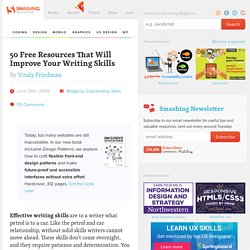
In our new book Inclusive Design Patterns, we explore how to craft flexible front-end design patterns and make future-proof and accessible interfaces without extra effort. Hardcover, 312 pages. Get the book now! Effective writing skills are to a writer what petrol is to a car. Of course, effective writing requires a good command of the language in which you write or want to write.
Further Reading on SmashingMag: Link We collected over 50 useful and practical tools and resources that will help you to improve your writing skills. How I use OneNote for my Dissertation « ProtoScholar. The question came up recently about how I am using OneNote for my dissertation note taking.

Sometimes show is easier than tell. I have one OneNote notebook called Dissertation. Within it, I have 8 sections: A few things about this: The first 5 sections reflect the 5 chapters required in my dissertation: Introduction, Literature Review, Methods, Findings, ConclusionI have a tab called Media into which I put less scholarly discussion around my topic. Within each section, I am creating multiple tabs with notes on specific sub-areas. Notice that the first tab is labeled structure. Below that, each 1st author has a tab. Build bibliographies fast with BibMe - Lifehacker. Kibin Offers Free Editing and Proofreading for Your Papers and Other Writing.
Nerd Paradise : How to Write a 20 Page Research Paper in Under a Day - StumbleUpon. Posted on: 10 Cado 7:0 - 5.27.29 So you've procrastinated again.

You told yourself you wouldn't do this 2 months ago when your professor assigned you this. But you procrastinated anyway. Shame on you. It's due in a few hours. Thesis Generator. Researching a Research Paper Quickly and Effectively. During high school and even during undergrad, I don't think I was ever properly taught how to quickly and effectively find research for writing a research paper.
I was taught some tips here and there, but it was challenging to find useful research and information for papers. Harness the Mental, Creative, and Emotional Benefits of Regular Writing. My journal has without a doubt been a transformational tool in my life. Just taking a bit of time to reflect on how the last week has gone and to renew my intentions for the coming week really keeps me on track, and alerts me early to any negative habits I am developing. It made it painfully clear to me why my NY Resolutions failed in the past. I simply didnt keep thinking about them. For me personally, having headings according to all the parts i want to keep in check (family, physical health, mental health, etc) works really well because it keeps me focussed on a balanced life.
Character Motivation Goal. Productivity. Grammar.